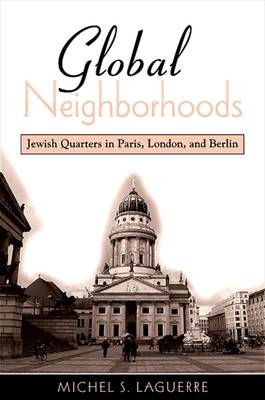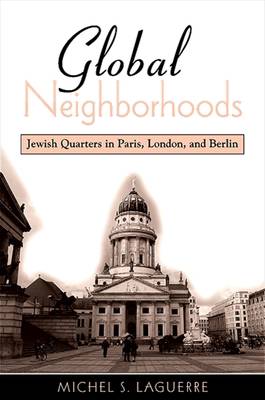
- Afhalen na 1 uur in een winkel met voorraad
- Gratis thuislevering in België vanaf € 30
- Ruim aanbod met 7 miljoen producten
- Afhalen na 1 uur in een winkel met voorraad
- Gratis thuislevering in België vanaf € 30
- Ruim aanbod met 7 miljoen producten
Global Neighborhoods
Jewish Quarters in Paris, London, and Berlin
Michel S LaguerreOmschrijving
Looks at how contemporary Jewish neighborhoods interact with both local and transnational influences.
Global Neighborhoods analyzes the organization of everyday life and the social integration of contemporary Jewish neighborhoods in Paris, London, and Berlin. Concentrating on the post-Holocaust era, Michel S. Laguerre explains how each urban diasporic site has followed a different path of development influenced by the local milieu in which it is incorporated. He also considers how technology has enabled extraterritorial relations with Israel and other diasporic enclaves inside and outside the hostland.
Shifting the frame of reference from assimilation theory to globalization theory and the information technology revolution, Laguerre argues that Jewish neighborhoods are not simply transnational social formations, but are fundamentally transglobal entities. Connected to multiple overseas diasporic sites, their interactions reach beyond their homelands, and they develop the logic of their social interactions inside this larger network of relationships. As with all transglobal communities, there is constant movement of people, goods, communications, ideas, images, and capital that sustains and adds vibrancy to everyday life. Since all are connected through the network, Laguerre contends that the variable shape of the local is affected by and affects the global.
Specificaties
Betrokkenen
- Auteur(s):
- Uitgeverij:
Inhoud
- Aantal bladzijden:
- 298
- Taal:
- Engels
Eigenschappen
- Productcode (EAN):
- 9780791475522
- Verschijningsdatum:
- 1/07/2009
- Uitvoering:
- Paperback
- Formaat:
- Trade paperback (VS)
- Afmetingen:
- 150 mm x 226 mm
- Gewicht:
- 476 g

Alleen bij Standaard Boekhandel
Beoordelingen
We publiceren alleen reviews die voldoen aan de voorwaarden voor reviews. Bekijk onze voorwaarden voor reviews.











